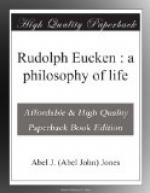Eucken’s great endeavour in his discussion of the Christian religion is to bring out the distinction between the eternal substance that resides in it and the human additions that have been made to it in different ages, between the elements in Christianity that are essentially divine and those essentially human. Divested of its human colourings and accretions, Christianity presents a basis of Divine and eternal truth, and this regarded in itself, can well claim to be the final and absolute religion.
The conclusion he has come to with regard to the eternal truth as contrasted with the temporary colourings of Christianity, with the essential as contrasted with the inessential, can best be outlined by taking in turn some of the main tenets and characteristics of the Christian faith.
Eucken’s conception of the negative movement is very much akin to the Christian idea of conversion. The first stage is merely a movement away from the world, but after a time, in the continuous process of negation, the negative movement attains a positive significance; when this stage is arrived at Eucken would apply the term conversion. He would not limit the negative movement to one act or to one point in time; the movement towards a higher world must be maintained—the sustaining of the negative movement being a test of the reality of conversion. The process of conversion is not a process to be passively undergone, or to originate from without, but is a movement starting in the depths of one’s own being.
As already pointed out, Eucken believes in redemption. The past is capable of reinterpretation and transformation, because we can view our past actions in a new light and so change the whole, since the past is not a closed thing, definite in itself, but a part of an incomplete whole. He considers, however, that the Christian doctrine of redemption makes it too much a matter of God’s mercy, instead of placing stress upon the part that man himself must play. The possibility of redemption in his view follows from the presence and movement of the spiritual life in man, not merely from an act of the founder of Christianity, and he avers that while traditional Christianity emphasises the need for redemption from evil, it does not emphasise sufficiently the necessary elevation to the good life that must result.
Closely bound up with the Christian doctrine of redemption is that of mediation. Eucken believes that the Christian conception of mediation resulted from the feeling of worthlessness and impotence of man, and the aspirations which yet burned within him after union with the Divine. The idea of mediation bridges the gulf, “a mid-link is forged between the Divine and the human, and half of it belongs to each side; both sides are brought into a definite connection which could be found in no other way.” Eucken acknowledges that such a mediation seems to make access to the Divine easier, gives intimacy to




